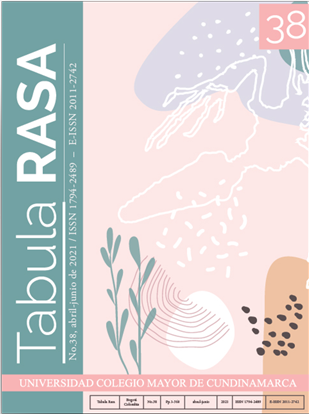Hacia una ética transdisciplinaria de los estudios globales.
Towards a cross-disciplinary ethics of world studies.
Mostrar biografía de los autores
Este artículo busca intervenir en los límites disciplinarios que hasta ahora han impedido el intercambio de ideas significativo entre diferentes formaciones intelectuales en los estudios de «literatura universal», «historia mundial», «arte universal», «música mundial», «cine mundial» y demás, en un conglomerado bajo el nombre de «estudios globales». En un momento en que la interconexión global se hace más y más crucial, además de profunda en nuestro momento contemporáneo, no solo por la globalización cultural y económica, sino también por la agudización de la crisis ecológica, el estudio del mundo como tal, sin importar cómo se defina desde diferentes puntos de vista ontológicos y epistemológicos, requiere un esfuerzo transdisciplinario concertado. Usando la literatura y la historia universales como ejemplos, en este artículo se realiza un esfuerzo transdisciplinario, a la vez que advierte contra la erección de centrismos alternativos en nuestra necesaria deconstrucción del eurocentrismo en nuestros estudios sobre el mundo.
Visitas del artículo 124 | Visitas PDF 116
Descargas
- Abu-Lughod, J. L. (1991). Before European Hegemony: The World System A.D. 1250-1350.
- Oxford: Oxford University Press.
- Aidi, H. D. (2005). Let Us Be Moors: Islam, Race, y “Connected Histories”. Souls: A Critical Journal of Black Politics, Culture, and Society, 7(1), 36-51. https://doi.org/10.1080/10999940590910032
- Aldridge, A. O. & Kamei, S. (1972). ‘A Note.’ Problems and Vistas of Comparative Literature in Japan and the United States: A Dialogue. Mosaic: An Interdisciplinary Critical Journal, 5(4), 149-163. https://www.jstor.org/stable/i24775427
- Bassnett, S. (1993). Comparative Literature: A Critical Introduction. Cambridge: Blackwell.
- Bose, S. (2006). A Hundred Horizons: The Indian Ocean in the Age of Global Empire. Cambridge, MA: Harvard University Press.
- Chang, S. Y. (2016). Wartime Taiwan: Epitome of an East Asian Modality of the Modern Literary Institution? En C. Rojas & A. Bachner. The Oxford Handbook of Modern Chinese Literatures (pp.417-439). Oxford: Oxford University Press.
- Chakravarty, D. (2000). Provincializing Europe: Postcolonial Thought and Historical Difference. Princeton, NJ: Princeton University Press.
- Chatterjee, P. (1986). Nationalist Thought and the Colonial World: A Derivative Discourse. New York: Zed Books.
- Chaudhuri, K. N. (1985). Trade and Civilization in the Indian Ocean: An Economic History from the Rise of Islam to 1750. Cambridge: Cambridge University Press.
- Eskildsen, R. (2002). Of Civilization and Savages: The Mimetic Imperialism of Japan’s 1874 Expedition to Taiwan. American Historical Review, 107(2), 388-418. https://doi.org/10.1086/ahr/107.2.388
- Fairbank, J. K. (1966). China’s World Order: The Tradition of Chinese Foreign Relations. Encounter, 27(6), 14-20.
- Fletcher, J. F. (1995). Studies on Chinese and Islamic Inner Asia, Manz, B.F. (Ed.). Aldershot, Hampshire: Variorum.
- Frank, A. G. (1998). Re-Orient: Global Economy in the Asian Age. Los Angeles: University of California Press.
- Frank, A. G. & Gills, B. K. (1994). The World System: Five Hundred Years or Five Thousand? New York: Routledge.
- Frank, J. (1991). The Idea of Spatial Form. New Jersey: Rutgers University Press.
- Glissant, E. (1997). Poetics of Relation (Trad. Betsy Wing). Ann Arbor: University of Michigan Press. https://www.press.umich.edu/10262/poetics_of_relation
- Hamashita, T. (2008). China, East Asia, and the Global Economy: Regional and Historical Perspectives. L. Grove & M. Seldon (eds.). Nueva York: Routledge.
- Harootunian, H. & Miyoshi, M. (Eds.). (2002). Leaning Places: The Afterlives of Area Studies. Durham: Duke University Press.
- Hobson, J. M. (2004). The Eastern Origin of Western Civilization. Cambridge: Cambridge University Press.
- Kleeman, F. Y. (2003). Under an Imperial Sun: Japanese Colonial Literature of Taiwan and the South. Honolulu: University of Hawaii Press.
- Levanthes, L. (1991). When China Ruled the Seas: The Treasure Fleet of the Dragon Throne, 1405-1433. Oxford: Oxford University Press.
- Pearson, M. (2013). The Indian Ocean. New York: Routledge.
- Pomoranz, K. (2001). The Great Divergence: China, Europe, and the Making of Modern World History. Princeton: Princeton University Press.
- Posnett, H. M. (1886). Comparative Literature. New York: D. Appleton and Company.
- Rama, A. (1996). The Lettered City. (trad. John Charles Chasteen). Durham: Duke University Press.
- Schiller, F. (1972 [1789]. The Nature and Value of Universal History: An Inaugural Lecture. History and Theory, 11(3) 321-334. https://www.jstor.org/stable/2504683?seq=1
- Shih, S. (2019). Racializing Area Studies, Defetishizing China. Positions, 27(1), 33-65. https://doi.org/10.1215/10679847-7251806
- Shih, S. (2013). Comparison as Relation. In R. Felski, & S. Friedman (Eds.). Comparison: Theories, Approaches, Uses, (pp.79-98). Baltimore: Johns Hopkins University Press.
- Shih, S. (2004). Global Literature and the Politics of Recognition. PMLA, 119(1), 16-30. https://www.jstor.org/stable/1261482?seq=1
- Shih, S. (2001). The Lure of the Modern: Writing Modernism in Semicolonial China, 1917-1937. Berkeley: University of California Press.
- Spivak, G. (2005). The Death of a Discipline. New York: Columbia University Press.
- Stoler, A. (1995). Race and the Education of Desire: Foucault’s History of Sexuality and the Colonial Order of Things. Durham: Duke University Press.
- Subrahmanyam, S. (2007). Holding the World in Balance: The Connected Histories of the Iberian Overseas Empires, 1500-1640. The American H istorical Review, 112(5), 1359-1385. https://doi.org/10.1086/ahr.112.5.1359
- Subrahmanyam, S. (2005). Explorations in Connected History: from the Tagus to the Ganges,
- Oxford: Oxford University Press.
- Subrahmanyam, S. (1999). Connected Histories: Notes Towards a Reconfiguration of Early Modern Eurasia. In V. Lieberman (ed.). Beyond Binary Histories: Reimagining Eurasia to c. 1830. Ann Arbor: University of Michigan Press.
- Zhao, T. (2006). Rethinking Empire from a Chinese Concept ‘All-under-Heaven’ (Tian-xia, 天下), Social Identities: Journal for the Study of Race, Nation and Culture, 12(1), 29-41. https://www.tandfonline.com/doi/abs/10.1080/13504630600555559#:~:text=Original%20Articles-Rethinking%20Empire%20from%20a%20Chinese%20Concept%20’All%2Dunder%2DHeaven,’%20(Tian%2Dxia%2C%20)&text=In%20this%20paper%20the%20author,hearts%20and%20a%20world%20institution
- Zhao, T. (2005). The Tianxia System: An Introduction to the Philosophy of World Institution (tianxia tixi). Nanjing: Jiangsu jiaoyu chubanshe.








